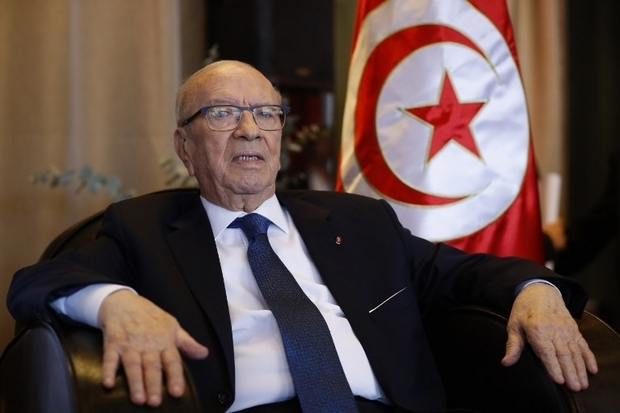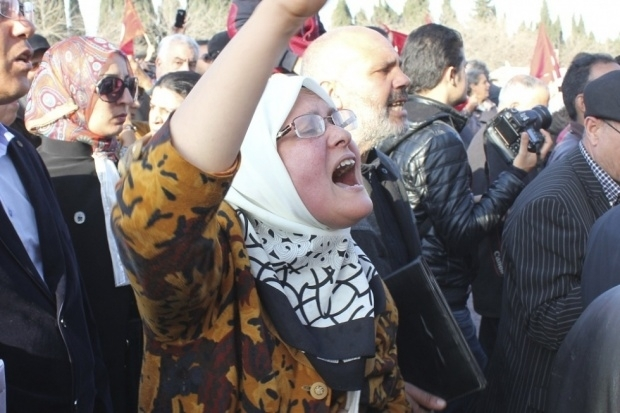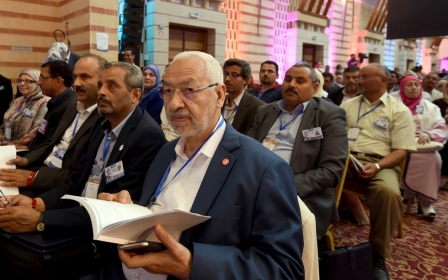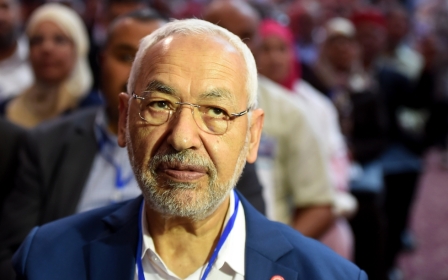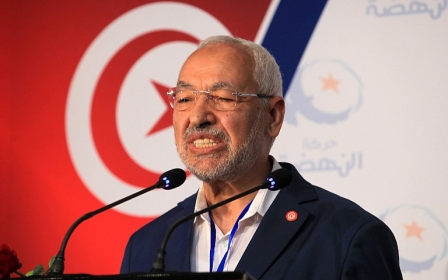Rached Ghannouchi: 'The Libyan crisis is a Tunisian crisis'
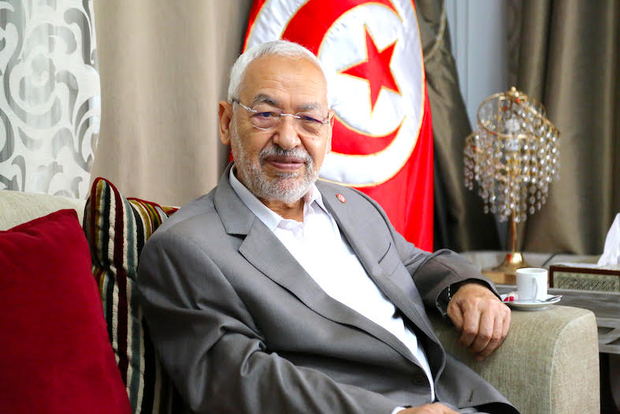
Six years after the revolution, Tunisia is still weakened by its unfinished democratic transition, as well as social and economic unrest at home and the Libyan crisis abroad.
Rached Ghannouchi, leader of the conservative Ennahda party, shared his thoughts with Middle East Eye on his party’s achievements in parliament and the return of radicalised nationals to Tunisia.
He also put forward his solution for “putting out the fire” in Libya, an issue he considers a major threat to the stability and development of Tunisia.
At the Ennahdha Movement’s 10th National Congress last May, you urged your party to abandon political Islam. How do things stand today?
Rached Ghannouchi: It was a major decision that required a number of changes. Certain figures within the movement chose to give up politics and redirect their efforts to preaching. They still belong to Ennahda, but only in a religious and social capacity.
They no longer hold important political positions, for example, like those on the Shura Council (advisory council), now working through accredited non-profit organisations. This is a stance we hope to reinforce in the future.
MEE: You are currently part of the government majority though President Beji Caid Essebsi was elected on an anti-Ennahdha platform. Is it possible to lead the country from within such a government coalition?
RG: The government is our government. We stand by it and encourage it and are confident it can succeed. We have the popular support needed to back it and protect it. We give it our full support in the Assembly of the Representatives of the People (ARP).
READ: Ghannouchi, like Mandela, risks all for reconciliation and democracy
Past experience shows that it is impossible to pass laws without Ennahdha's support and approval, and thus without consensus with Nidaa Tounes (the presidential party, and the second-largest bloc in parliament).
We are involved in on-going discussions with both the prime minister, Youssef Chahed (from Nidaa Tounes), and the president.
MEE: Why is the Libya question at the top of your political agenda?
RG: The Libyan crisis is a Tunisian crisis. The solution to part of our problems resides in Libya. Security issues directly impact economic development. Prior to the revolution, over half a million Tunisians worked in Libya. If these people could go back there to work, unemployment in Tunisia (currently 15.5 percent unemployment, or roughly 625,000 jobless) would be eliminated.
Furthermore, all of the terrorist attacks perpetrated in Tunisia were mounted from Libya. It destroyed the tourism industry. And lastly, the Tunisian-Libyan border is enormous and open. It would be impossible to build a wall there.
MEE: Yet that is what the Tunisian government decided to do in early 2015, with the construction of what it calls a system of obstacles...
RG: Closing the border will cause problems in Tunisia. Whenever the border is closed, the security situation in Ben Guerdane and Tataouine (both in south-east Tunisia) explodes, impacting the entire region, as far away as Sfax. The southern half of Tunisia has close ties to Libya. Normalising relations with Libya is the only solution. The fire must be extinguished.
MEE: How are you planning on doing this?
RG: Tunisia today is seen as an example that could be replicated in Libya, a model for the reconciliation of both Islamist and non-Islamist forces, as well as revolutionary groups and supporters of the old regime. We are in contact with all of the political parties in Libya, including the Gaddafists, the revolutionaries and the Islamists. We met many of them when we were in exile in London, Switzerland and the United States.
We are also in touch with the United Nations. I met with Martin Kobler (head of United Nations Support Mission in Libya) a month ago. I suggested a joint effort among all of the countries bordering Libya to bring the crisis to an end. He seemed to agree and has since put the idea forward himself.
This “Arab initiative”, as we are calling it, is being led by Beji Caïd Essebsi, Abdel Fattah el-Sisi (the president of Egypt) and Abdelaziz Bouteflika (the president of Algeria). And we are using all of our contacts with Libya’s political parties to help make the initiative happen (a meeting among the foreign ministers of the three countries spearheading the initiative has already been planned in Tunis).
EXCLUSIVE: Russia's secret plan to back Haftar in Libya
On Wednesday, a meeting took place here in my office between two key figures: Ahmed Ouyahia, the chief of staff to President Bouteflika, and Ali al-Sallabi, a prominent Libyan scholar and Islamist politician [Muslim Brotherhood member associated with Abdelhakim Belhadj, a prominent Islamist politician and former militant]. We convinced him to take part in this Arab initiative. Al-Sallabi, who was initially reluctant, has agreed to discuss the proposal in Libya.
MEE: Ali al-Sallabi is an Islamist, so it’s not surprising that the two of you are on good terms. But what about someone like Khalifa Haftar, east Libya’s strongman who is actively fighting Islamist militias? Do you think he would be open to such talks?
RG: Sheikh Sallabi and Khalifa Haftar are on very good terms. And I would be willing to meet him myself. There has already been some contact between us, for that matter.
MEE: In Tunisia, you are accused of conducting parallel diplomatic missions...
RG: This would be true if I were opposing official diplomatic policy. In my case, it is more like a form of popular diplomacy serving the country’s official diplomatic stance. If the president told me this were a problem, I’d stop. I’m in constant contact with him, so our efforts can only impact his policies positively.
MEE: The issue of how to deal with the return of Tunisian nationals who have fought for IS – between 2,900 and 5,500 fighters, depending on sources – has been widely debated. Some people are demanding a ban on their return. Where do you stand on this issue?
RG: We do not want them to return but the law is on their side. The Tunisian constitution guarantees the right of fellow citizens to return home. We have courts and prisons, and terrorists must be brought before Tunisian justice. They are criminals and they belong in prison.
They will fall under the anti-terrorist law (of July 2016), and then the specialists, like religious authorities and psychiatrists, will decide how best to handle their pathology. And if they do in fact return to Tunisia, they will be able to tell us who sent them to the conflict zones – if in fact they were actually sent to them. These criminals have convictions of their own and after the revolution, when the country opened up, everyone was free to travel.
MEE: It is said that Ennahda’s role in the Troika (the coalition government which ran the country between 2011 and 2014) encouraged these fighters to leave...
RG: That was nothing more than a lot of political skirmishing. The country is heading toward (local) elections and certain parties are worried we may win, because Ennahda is the best organised party in the country. They are using scare tactics, linking us to terrorism. But Ennahdha actually leads the front against terrorism. Our detractors forget to mention that Ansar al-Sharia was designated a terrorist organisation (on 28 August 2013) under the Ennahda government. We declared war on the organisation and banned their meetings.
MEE: The legal framework for holding municipal elections has yet to be amended by the governing ARP. The local elections, originally planned for October 2016, have been postponed. Are political forces at play here? Are certain political parties concerned about Ennahda’s eventual success?
RG: Discussions are underway with the other groups, and we are hoping to come to an agreement, particularly on the subject of the voting rights of security force members (a policy opposed by Ennahdha).
No laws can be amended either without us or by us alone. The elections are not about aiming for political imbalance. What counts here is achieving Tunisia’s democratic transition by holding municipal elections.
MEE: You are looking more and more like an international figure these days. Have you already set your sights on the 2019 presidential election?
RG: No, that’s not on my current agenda. We will talk about that when the time comes.
This article was originally published on Middle East Eye's French website.
Middle East Eye propose une couverture et une analyse indépendantes et incomparables du Moyen-Orient, de l’Afrique du Nord et d’autres régions du monde. Pour en savoir plus sur la reprise de ce contenu et les frais qui s’appliquent, veuillez remplir ce formulaire [en anglais]. Pour en savoir plus sur MEE, cliquez ici [en anglais].


